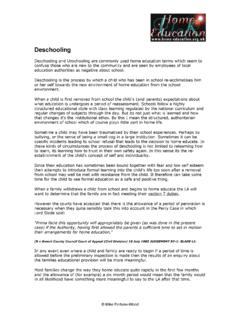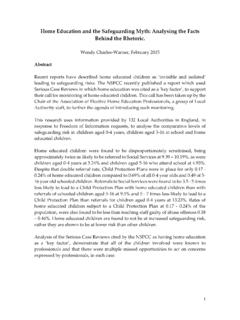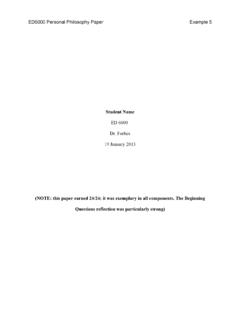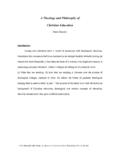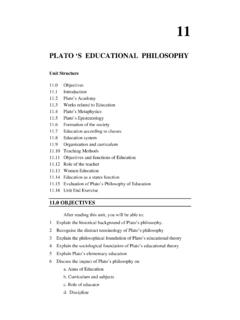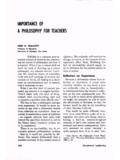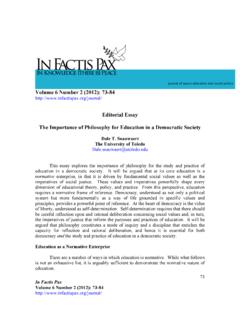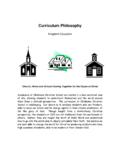Transcription of An Autonomous Educational Philosophy - Home …
1 Mike Fortune-Wood An Autonomous Educational Philosophy Theoretical Background This Educational Philosophy is rooted in the epistemology or Karl Popper, who proposed a new view of learning, no longer based on the inductive view of learning, but on the premise that true instruction comes from within. "We do not discover new facts or new effects by copying them, or by inferring them inductively from observation, or by any other method of instruction by the environment. We use, rather, the method of trial and the elimination of error. As Ernst Gombrich says, 'making comes before matching': the active production of a new trial structure comes before its exposure to eliminating tests." (The Myth of the Framework, pp. 8-9) On such a theory, extrinsic motivation is ruled out as a totally ineffective strategy for learning, rather intrinsic motivation and problem solving are at the heart of learning, The theoretical basis of my Educational Philosophy is that: 1.
2 The child/learner is best placed to know what best suits her intrinsic motivation to learn provided that she has a rich and stimulating environment in which to operate as a learner. 2. Learning should follow the child/learner's questions. 3. The child is an active learner with her own unique set of interests, concerns, questions and problems that she is actively addressing at any moment. The role of education is to support this. 4. The growth of knowledge is a creative and non-mechanical process within the mind of the learner. An environment with access to a large range of resources, conversation, experiences outside the home etc, is best placed to nurture and facilitate this process. 5. Education is about every aspect of learning, every opportunity for conjecture and refutation. Autonomous education is about having the conditions for self-direction within life. Autonomous education does not divide life up into 'education' and 'not education'.
3 Mode of Learning As an overall paradigm, the constructivist theory of learning is more supportive of an Autonomous style of education. In this theory emphasis is placed on the learner and it is the learner who interacts with problems to construct his/her own solutions and ideas. The autonomy and initiative of the student is a given and learning is something which takes place in the learner's mind rather than being transmitted from the outside. Conjecture and refutation are essential features of learning and children are given the opportunity to build on earlier ideas and knowledge. The emphasis of this theory is not on the teaching, but on the learning and the process of learning is more important than an end product. The constructivist theory of learning is also more likely to operate well in real life situations. Mike Fortune-Wood Autonomy and intrinsic motivation Autonomy is the right of self-government and free will.
4 Education is the process by which we develop intellectual potential and foster the growth of knowledge. Education relies on a rational development of conjecture and refutation. Autonomous education is simply that process by which knowledge grows because of the intrinsic motivation of the individual. In fact, the core to understanding Autonomous education is in understanding the absolutely fundamental and unshakeable role of intrinsic motivation. Basic Skills It is a core assumption of Autonomous education that children will acquire the skills they need to take advantage of their environment and pursue their own aspirations. As such literacy and numeracy are not forced components of a curriculum, but are outcomes within the process acquired in numerous ways, both formal and informal, depending on the child's questions and developing Educational priorities. What could be more efficient than a child learning something to suit his or her own intrinsic and individual purposes?
5 Socialisation The combination of autonomy and learning in the real world with access to a broad range of social experiences spanning all age groups has an enormously positive influence on the socialisation process. In an Autonomous learning situation the delicate and complicated balance between being a social creature and the growth of personal knowledge are not put under the enormous and artificial pressures for conformity and homogeneity. Rather, the child is supported in negotiating their own solutions to complex social situations. Progress Monitoring and evaluation are not neutral tools, but effect the process they attempt to analyse or describe. Any kind of monitoring that intrudes on the process will tend to objectify education as a discrete part of life rather than as an integral and inevitable element of life. What is therefore most relevant to ensuring that progress will occur is that parents are highly committed to ensuring that the child has every opportunity to pursue whatever it is they want to pursue for as long as it is relevant to the child.
6 Autonomous learning takes place all the time, in all contexts and is efficient by definition (see above) The aims of Autonomous education are: 1. To respects the child as a real person with a right to her own thoughts. 2. To maximise the innate impulses to learn. 3. To maximise children's opportunities to participate in real life contexts for learning and to succeed in a modern society. 4. To give full scope to successful learning systems. Particularly conversation and multi media opportunities. 5. To allow for undamaged emotional and personal development. 6. To allow children to develop such abilities as being able to define problems, ask hard questions, work independently, argue coherently and use a wide range of thinking strategies. 7. To establish a model for life long learning. Mike Fortune-Wood In conclusion Autonomous education is a valid system of education, which allows children and young people to develop the lifelong habit of being self-directed and intrinsically motivated learners.
7 Autonomous education takes as its premise the idea of instruction from within. Education is the process by which we develop intellectually as our knowledge grows and it relies on the rational development of conjecture and refutation. Autonomous education is simply that process by which knowledge grows because of the intrinsic motivation of the individual. The core to understanding Autonomous education is the primacy of intrinsic motivation. Autonomous education, in addition to being centred in the child's intrinsic motivation, demands a broad definition of education, a step back from the products and outcomes thinking of conventional education, a positive view of children as creative and rational and an ability to conceive of problems as having solutions. Autonomous education does not have a list of essentials, but considers that children will learn whatever they need to live the lives they choose and they will do so at ages that suit their own particular and individual processes.
8 Education is not something that can be demarcated from the bulk of life, but rather involves the whole of life, in both breadth and duration. Autonomous education is not only theoretically supportable, but also a consistent legal way for parents to discharge their duties to educate their children under section 7 of the 1996 Education Act It is the optimal approach for ensuring that a process of flexible, creative, lifelong learning is set in motion. Jan Fortune-Wood
